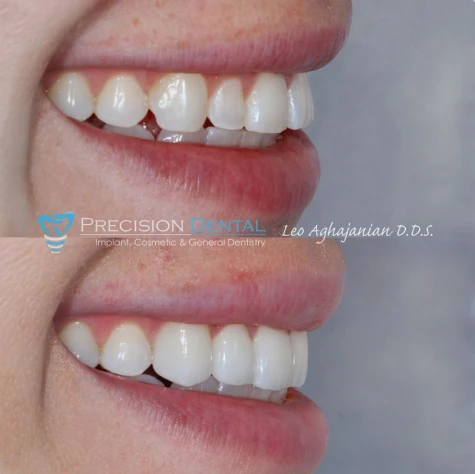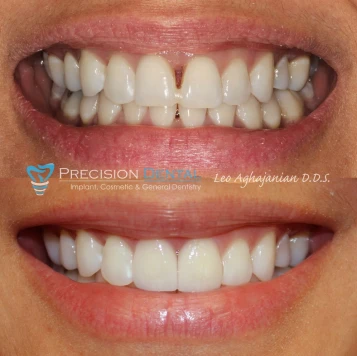TMJ Disorder
What is TMJ Disorder?
The temporomandibular joint is the joint between the jaw and the temporal bone of the skull. Thanks to the presence of ligaments, tendons and muscles that support this joint, the movements of the jaw can be performed.
TMJ disorder or the dislocation of the temporomandibular joint is characterized by a hypermobility of the joint due to the presence of laxity and weakness of the joint ligaments. Clinically, TMJ disorder occurs just as an oral opening does, with an inability to close the mouth, and a limitation of contact between the teeth. In the acute phase of TMJ disorder, there is intense pain, a limitation of the movement angle and an absence of joint clicking during normal functions.

What causes TMJ disorder?
TMJ Disorder can happen due to several factors, which our dentist in Glendale will explain below:
- Anatomical alterations of the joint.
- Bruxism (teeth grinding).
- Osteoarthrosis of the joint.
- Habits like nibbling on hard objects or smoking pipes.
- Wind instrument musicians.
- Joint hypermobility.
- Some diseases such as Huntington's disease, Parkinson's disease or myotonic dystrophy.
- Stress.
Other factors that contribute to TMJ Disorder are:
- Trauma at the level of the joint or chin with the mouth open.
- Manipulation of the jaw under general anesthesia in dental procedures, in orotracheal intubation or laryngoscopy and other endoscopic procedures.
- Wide opening maneuvers such as yawning, laughing or vomiting.
Is TMJ Disorder curable?
TMJ Disorder is curable, but you must visit your doctor immediately. Do not let a lot of time pass by before putting yourself in the hands of a dentist who will evaluate the situation and offer you a possible solution. These solutions may include repositioning the jaw through manual massages.
Will I need to go through surgery is I have TMJ Disorder?
Surgery is an option, but it is reserved for more complicated and serious cases. What is truly vital is visiting the dentist as soon as possible. A problem that can be solved in a very short amount of time and in a simple way could lead to something more serious. In fact, tissue scarring around the joint can be difficult to solve.
If you are currently suffering from TMJ disorder, make sure to schedule a dental appointment at Precision Dental immediately so Dr. Aghajanian can provide you with the most suitable treatment for your specific case.

We are waiting for your next visit!
CALL US!
(818) 545-8923

